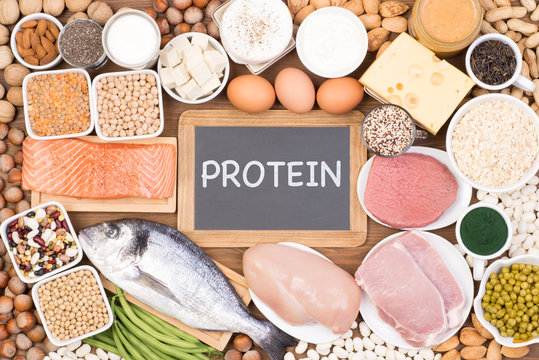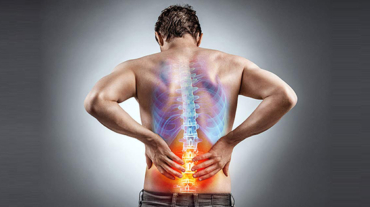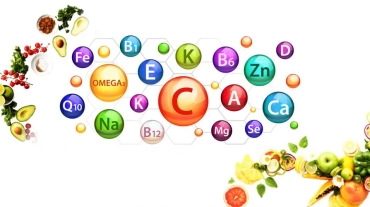Protein is one of the three macronutrients (along with carbohydrates and fats) essential for the body. It is made up of amino acids, which are the building blocks for muscle tissue, enzymes, hormones, and various other vital structures in the body.
Protein is a vital macronutrient that plays a central role in the body’s structure and function. It is made up of smaller molecules called amino acids, which are linked together in specific sequences to form proteins. There are 20 different amino acids, and the body uses a combination of these to build the thousands of different proteins it needs.
Proteins are involved in nearly every biological process. They are crucial for the growth, repair, and maintenance of tissues, making them essential for healthy muscles, skin, organs, and cells. Proteins also play key roles in immune function, enzyme production, hormone regulation, and transporting molecules like oxygen throughout the body.
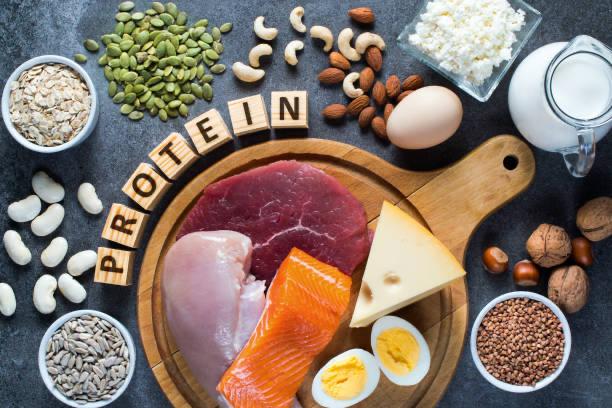
Since the body cannot store protein in the same way it does fats or carbohydrates, it must be consumed regularly through food. High-protein foods include meat, fish, eggs, dairy, legumes, nuts, and some grains and vegetables. Proteins are particularly important for athletes, those recovering from injury, and individuals looking to maintain or build muscle mass
BENEFITS OF PROTEIN :
1) Muscle Growth and Repair:
Protein is crucial for building and repairing muscles. After exercise, particularly strength training, protein helps repair muscle fibers that break down, leading to muscle growth and improved strength over time.
2) Supports Immune Function:
Proteins are essential for the production of antibodies and immune system cells. These help the body fight infections and diseases, contributing to overall immune health.
3) Enzyme and Hormone Production:
Many enzymes that catalyze biochemical reactions in the body, as well as hormones like insulin, are proteins. These enzymes and hormones regulate metabolism, digestion, and other vital processes.
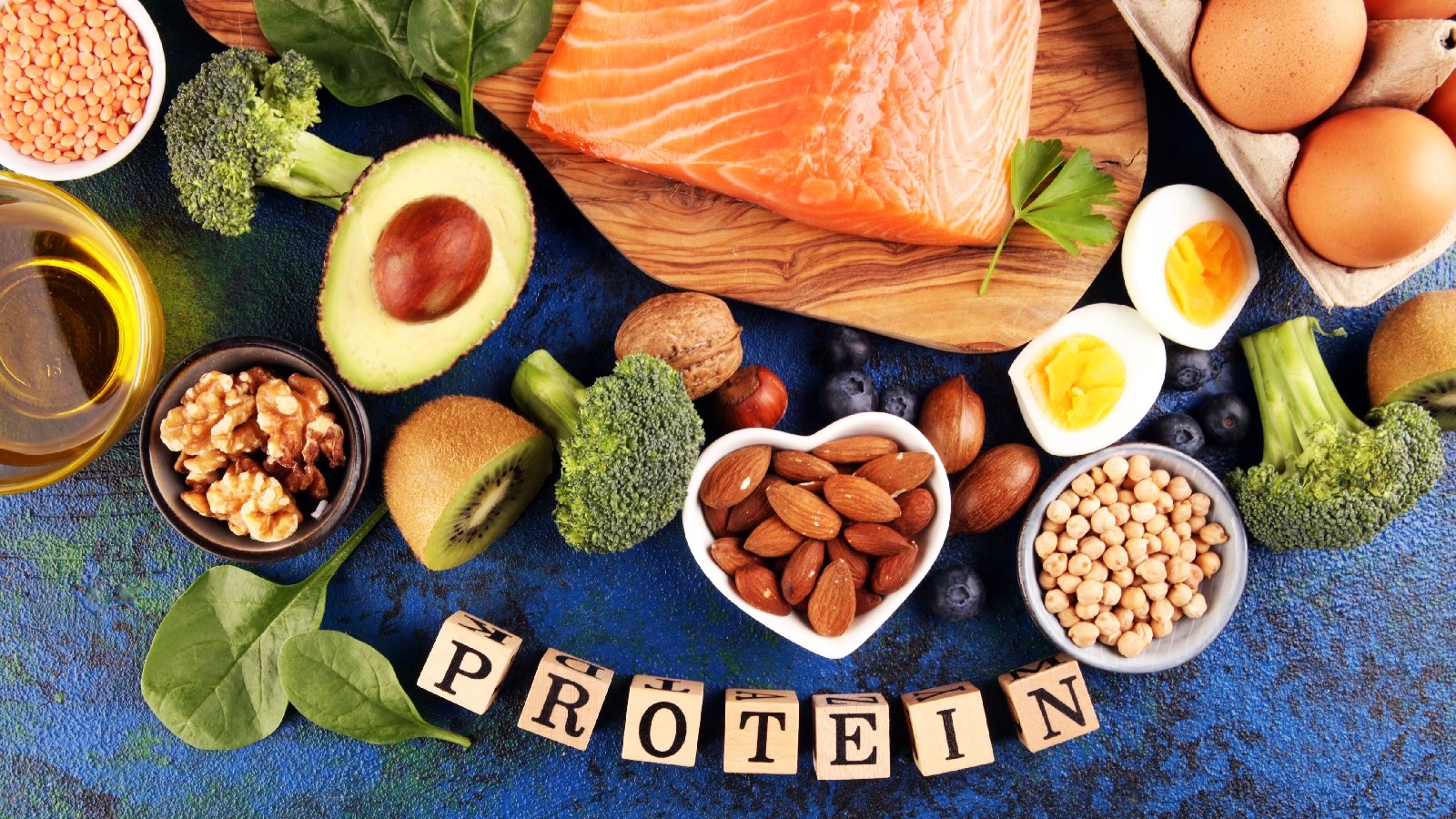
4) Hair, Skin, and Nail Health:
Protein contributes to the growth and repair of tissues, including
hair, skin, and nails. Collagen, a structural protein, plays a key role in maintaining the elasticity of the skin.
5) Weight Management:
Protein helps in weight management by promoting satiety, which means you feel fuller for longer. It also increases thermogenesis (calories burned during digestion), helping to support fat loss while preserving lean muscle mass.
6) Supports Healthy Bones:
Protein plays a role in bone health by contributing to the formation of bone matrix. Adequate protein intake can help maintain bone density and reduce the risk of osteoporosis.
7) Improved Metabolism and Energy:
Protein helps in the regulation of various metabolic processes. While it doesn’t directly provide energy like carbohydrates or fats, protein can be used as an energy source when needed, especially when glycogen stores are low.
8) Blood Sugar Regulation:
Protein can help stabilize blood sugar levels by slowing the absorption of glucose into the bloodstream, which is beneficial for people with diabetes or those looking to prevent blood sugar spikes.
SOURCES OF PROTEIN
Protein can be obtained from a variety of both animal and plant-based sources. Here are some common sources of protein:
*Animal-Based Protein Sources:-
•Meat (e.g., chicken, turkey, beef, lamb, pork) – High-quality protein with all essential amino acids.
•Fish and Seafood (e.g., salmon, tuna, shrimp, cod) – Rich in protein and omega-3 fatty acids.
•Eggs – A complete source of protein, with all nine essential amino acids.
•Dairy Products (e.g., milk, yogurt, cheese) – Excellent sources of protein, with the added benefit of calcium.
•Poultry (e.g., chicken, turkey) – Lean sources of protein, often lower in fat than red meats.
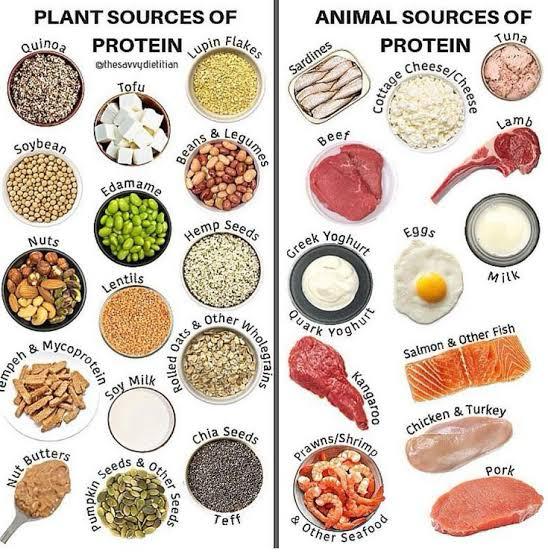
*Plant Based Protein Sources:-
•Legumes (e.g., lentils, chickpeas, black beans, kidney beans) – Great source of protein and fiber.
•Nuts and Seeds (e.g., almonds, peanuts, chia seeds, hemp seeds, sunflower seeds) – High in protein and healthy fats.
•Tofu and Tempeh – Both are soy-based and packed with protein, making them popular meat substitutes for vegetarians and vegans.
•Quinoa – A complete protein that contains all nine essential amino acids, unlike most grains.
•Whole Grains (e.g., oats, farro, barley, brown rice) – While not as protein-dense as legumes or animal products, whole grains provide a moderate amount of protein.
•Green Vegetables (e.g., spinach, broccoli, peas) – While lower in protein than other sources, certain vegetables can still provide a helpful amount of protein, especially in larger quantities.
•Protein-Rich Plant-Based Foods:-
•Spirulina: A blue-green algae that is incredibly high in protein, often used in smoothies and supplements.
•Nutritional Yeast: A deactivated yeast often used in vegan cooking for its cheesy flavor and high protein content.
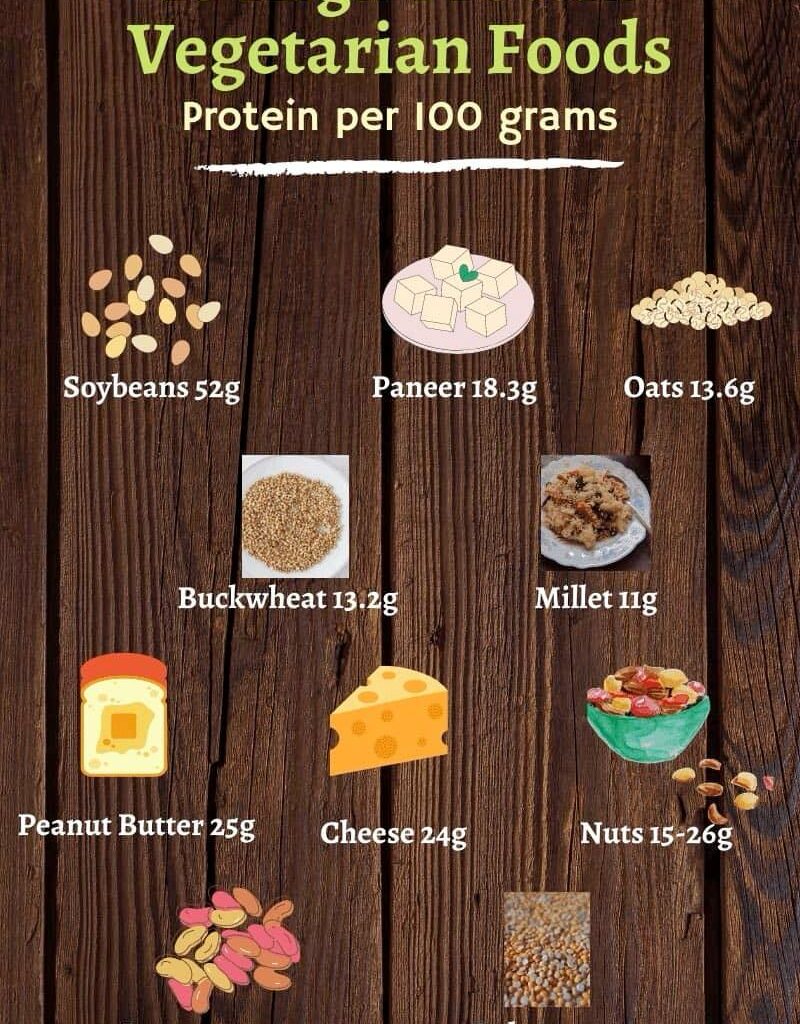
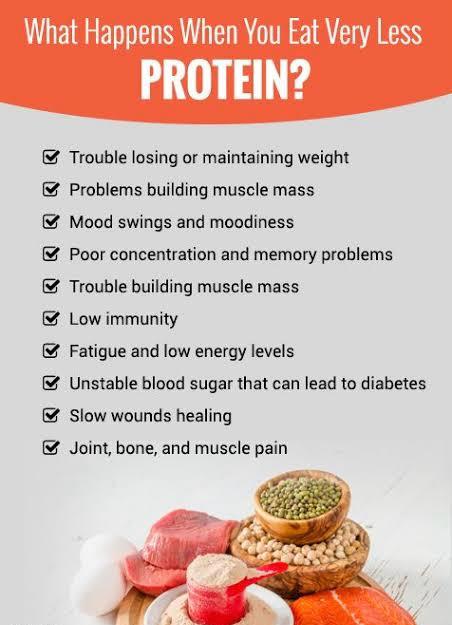
RECOMMEND DAILY ALLOWANCE :
The recommended daily allowance (RDA) for protein varies depending on age, sex, activity level, and specific health goals. However, the general guidelines for most people are as follows:
General Protein Recommendations:-
•Adults (18 and older):
RDA: 0.8 grams of protein per kilogram of body weight (g/kg) per day.
•Active Individuals / Athletes:
Endurance Athletes (e.g., long-distance runners): 1.2 to 1.4 g/kg of body weight.
Strength Athletes (e.g., weightlifters, bodybuilders): 1.6 to 2.2 g/kg of body weight.
•Older Adults (over 65 years):
Recommendation: 1.0 to 1.2 g/kg of body weight per day.
Older adults may require more protein to maintain muscle mass and prevent age-related muscle loss (sarcopenia).
•Pregnant and Lactating Women:
•Pregnant Women: An additional 25 grams of protein per day over the normal RDA.
•Lactating Women: About 1.1 g/kg per day, with an emphasis on maintaining protein for both maternal health and milk production.
IS PROTEIN GOOD FOR HEART HEALTH :
Yes, protein can be beneficial for heart health when consumed as part of a balanced diet. Specifically, plant-based proteins (like beans, lentils, nuts, and seeds) and lean animal proteins (like fish, poultry, and low-fat dairy) are often considered heart-healthy.
•Improved Blood Pressure Regulation: Protein, especially from plant-based sources, can help improve blood vessel function and support healthy blood pressure levels. Certain proteins contain peptides that act like natural ACE inhibitors, which are compounds that help relax blood vessels and lower blood pressure.
•Weight Management: High-protein foods can increase feelings of fullness, helping with appetite control and weight management. Maintaining a healthy weight is crucial for heart health, as excess weight can contribute to conditions like hypertension, high cholesterol, and diabetes—all of which increase heart disease risk.
•Reduced Inflammation: Chronic inflammation is a key factor in the development of heart disease. Protein-rich foods like fish (especially fatty fish such as salmon) contain omega-3 fatty acids, which have anti-inflammatory properties that may help protect the heart.
•Cholesterol Control: Certain proteins, particularly plant-based sources like soy, can help lower LDL (bad) cholesterol and raise HDL (good) cholesterol levels. This contributes to a healthier lipid profile, reducing the risk of plaque buildup in the arteries.
•Better Blood Sugar Control: Protein helps stabilize blood sugar levels, which is important for people at risk of or living with diabetes—another significant risk factor for cardiovascular disease. High-protein meals can prevent blood sugar spikes and crashes.
•Improved Lipid Profile: Studies suggest that diets rich in lean protein sources can help improve overall lipid profiles by lowering triglycerides and harmful LDL cholesterol while boosting beneficial HDL cholesterol.
Manushree Kaushik
Nutrition consultation
MSc (Food & Nutrition)
Gold Medalist
Onerehab24by7
